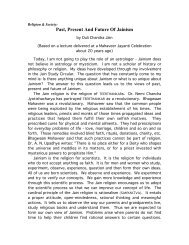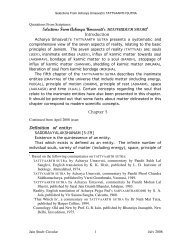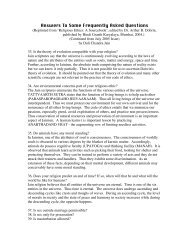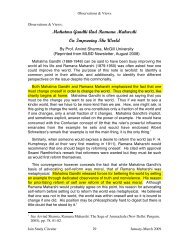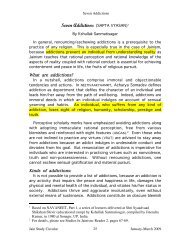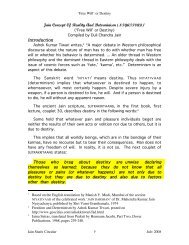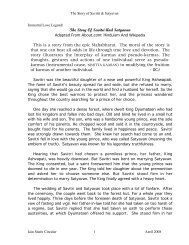Materialism And Happiness - The Jain Study Circle
Materialism And Happiness - The Jain Study Circle
Materialism And Happiness - The Jain Study Circle
Create successful ePaper yourself
Turn your PDF publications into a flip-book with our unique Google optimized e-Paper software.
Observations & Views<br />
Observations & Views:<br />
<strong>Materialism</strong> <strong>And</strong> <strong>Happiness</strong><br />
(Non-possessiveness In Western Thought)<br />
Commenting on materialism and happiness from the perspective of the<br />
<strong>Jain</strong> religion, Shri Surendra Bothra writes, 1 “<strong>The</strong> primary goal of man is to<br />
lead a healthy and happy life. Many individuals relate happiness to<br />
material possessions. Things such as a big house, expensive cars and<br />
fancy clothes lead to happiness. But it is just a mirage. In reality,<br />
contentment and non-possessiveness bring genuine happiness and peace<br />
of mind.” Modern researchers also have come to a similar conclusion.<br />
Alain de Botton writes, 2 “<strong>The</strong> advantages of two thousand years of<br />
Western civilization are familiar enough: an extraordinary increase in<br />
wealth, in food supply, in scientific knowledge, in consumer goods, in<br />
physical security, in life expectancy and economic opportunity. What is<br />
perhaps less apparent and more perplexing is the way that such<br />
impressive material advances may have gone hand in hand with<br />
a phenomenon: … a rise in levels of status anxiety among<br />
ordinary Western citizens, by which is meant a rise in levels of<br />
concern about importance, achievement and income.”<br />
In a paper posted on the National Bureau of Economic Research<br />
website, economists David Blanchflower of Dartmouth and <strong>And</strong>rew Oswald<br />
of Warwick University report that 3 "generation after generation,<br />
Americans (like Japanese) are becoming more unhappy. De<br />
Tocqueville knew as much more than 150 years ago: ‘So many lucky<br />
men, restless in the midst of abundance.’ … Research shows that it's<br />
better to be middle class than poor. Things get complicated as you move<br />
further out on the ‘swinishly wealthy’ axis, because $100 million doesn't<br />
buy a hundred times the pleasure of $1 million. But no one stops earning<br />
money or striving for more money."<br />
James’s equation 4<br />
Self-esteem = Success<br />
Pretensions<br />
illustrates how every rise in our levels of expectation entails a rise in the<br />
dangers of humiliation.<br />
1<br />
2<br />
3<br />
4<br />
Non-possessiveness: A Medicine For <strong>The</strong> Ailing Environment by Shri Surendra<br />
Bothra, <strong>Jain</strong> <strong>Study</strong> Circular, April 2008.<br />
Status Anxiety by Alain de Botton, Penguin Books, 2004, page 45.<br />
From the column, ‘<strong>The</strong> Secret to <strong>Happiness</strong>? Who Knows?’ by Alex Beam, published<br />
in <strong>The</strong> Boston Globe of April 20, 2008.<br />
Status Anxiety by Alain de Botton, Penguin Books, 2004, pages 55-56.<br />
<strong>Jain</strong> <strong>Study</strong> Circular 28<br />
July 2008
Observations & Views<br />
James pointed out: “To give up pretensions is as blessed a relief as to<br />
get them gratified. <strong>The</strong>re is a strange lightness in the heart when one’s<br />
nothingness in a particular area is accepted in good faith.”<br />
Alain de Botton states, 5 “Criticisms of consumer society have focused<br />
not only on the shortcomings and inadequacies of the products, … but<br />
also, more fairly perhaps, on the distorted picture of our needs that<br />
ensues from the way these products are presented to us. <strong>The</strong>y can<br />
appear essential, blessed with extraordinary powers to bestow happiness<br />
on us, because we understand neither their actual identities nor our own<br />
functioning.”<br />
In fact, contentment is the key to happiness. Consider Rousseau’s<br />
argument that states, 6 “Every time we seek something we cannot<br />
afford, we grow poorer, whatever our resources. <strong>And</strong> every<br />
time we feel satisfied with what we have, we can be counted<br />
as rich, however little we may actually own.”<br />
* * * * * * *<br />
Scenarios From Ancient History<br />
(Who Discovered America?)<br />
An interesting article by Ricardo Palleres entitled ‘Who Discovered<br />
America?’ is posted on the website www.archaeologyonline.net. In the<br />
article, the author raises the questions: “What if Europe was really in<br />
darkness in comparison to the Far East and India that Columbus set sail to<br />
find? … What if Hindus and Hopis, Advaitins and Aztecs, Tibetan monks<br />
and Mayans were part of one world culture -- a spiritual one?” …<br />
Ricardo Palleres continues, “Another historical scenario: <strong>The</strong> spiritually<br />
sophisticated Asians were the first to set foot on Western shores, and<br />
Asia, not Europe, was the seat of culture. <strong>The</strong> central focus of that<br />
culture was genuine spiritual development, not the mere shadow of the<br />
same in the form of the politically-motivated Pauline Christianity and later<br />
the Protestant ethic, which licensed humankind's exploitation of nature.<br />
“This theory is found in the Vedic literature of India. <strong>The</strong> ancient<br />
Puranas (literally, histories) and the Mahabharata make mention of the<br />
Americas as lands rich with gold and silver …<br />
“Many historians have scrutinized historical evidence to find<br />
more insight into the marvelous cultures that populated the<br />
5<br />
Status Anxiety by Alain de Botton, Penguin Books, 2004, page 205.<br />
6 Status Anxiety by Alain de Botton, Penguin Books, 2004, page 62.<br />
<strong>Jain</strong> <strong>Study</strong> Circular 29<br />
July 2008
Observations & Views<br />
American continent before Christopher Columbus was born.<br />
<strong>The</strong>ir thirst for research was based on the assumption that the<br />
great Mayan, Aztec, and Incan civilizations could not have<br />
appeared all of a sudden in the Western world. Rather, they<br />
must have received strong influence from ancient Eastern<br />
cultures, mainly from India.”<br />
In the same vein, W. H. Prescott writes, 7 “When Pizarro obtained<br />
possession of Cuzco, he found a country well advanced in the arts of<br />
civilization; institutions under which the people lived in tranquility and<br />
personal safety; the mountains and the uplands whitened with flocks; the<br />
valleys teeming with the fruits of a scientific husbandry; the granaries and<br />
warehouses filled to overflowing; the whole land rejoicing in its<br />
abundance; and the character of the natives, softened under the<br />
influence of the mildest and most innocent form of superstition, well<br />
prepared for the reception of a higher and a Christian civilization. But far<br />
from introducing this, Pizarro delivered up the conquered races to his<br />
brutal soldiery; the sacred cloisters were abandoned to their lust; the<br />
towns and villages were given up to pillage; the wretched natives were<br />
parceled out like slaves, to toil for their conquerors in the mines; the<br />
flocks were scattered, and wantonly destroyed; the granaries were<br />
dissipated; the beautiful contrivances for the more perfect culture of the<br />
soil were suffered to fall into decay; the paradise was converted into a<br />
desert. Instead of profiting by the ancient forms of civilization, Pizarro<br />
preferred to efface every vestige of them from the land and on their ruin<br />
to erect the institutions of his own country. Yet these institutions did<br />
little for the poor Indian, held in iron bondage.”<br />
Bhikkhu Chaman Lal has presented similar views in his book ‘Hindu<br />
America’.<br />
7<br />
<strong>The</strong> Conquest of Mexico: the Conquest of Peru and Other Selections by W. H. Prescott,<br />
Edited, Abridged, and with an Introduction by Roger Howell, Twayne Publishing Inc,<br />
NY 1966, pages 297-298.<br />
<strong>Jain</strong> <strong>Study</strong> Circular 30<br />
July 2008



